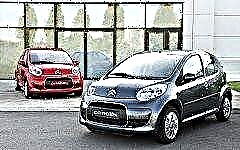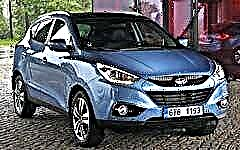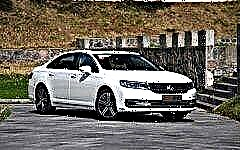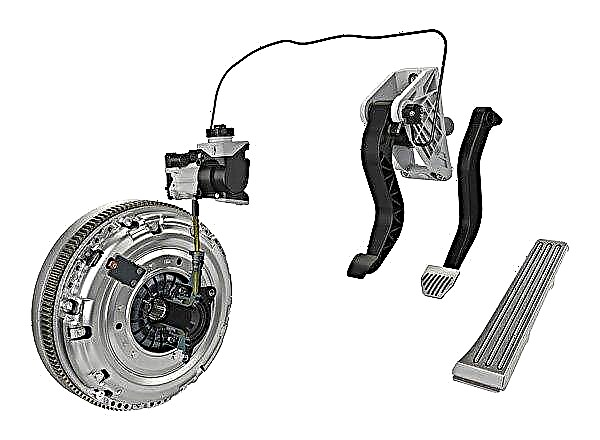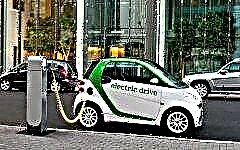

Rating content:
- Tesla Model S Extended Range
- Tesla Model 3 Long Range
- Tesla Model X Extended Range
- Mercedes-Benz EQC
- Hyundai kona electric
- Audi e-tron quattro
- Kia e-Niro
- Chevrolet bolt
- Jaguar I-Pace
- Nissan Leaf e plus
Today, it's hard to imagine a popular car manufacturer in an arsenal that doesn't have a lineup of electric vehicles. We can say this is one of the most rapid trends in the development of transport structure. Fuel economy, all kinds of environmental pollution and other nuances from which electric cars go aside.
If even 10 years ago, the models of electric vehicles could be counted on the fingers, then today there are countless numbers that are even difficult to remember. The main characteristic of an electric vehicle is the power reserve, it shows how hardy the "iron horse" is and what it is capable of. To understand which electric car is the most durable and got the maximum power reserve, consider the TOP-10 rating.
1. Tesla Model S Extended Range

The first model in the ranking was the Tesla Model S "Extended Range" electric car. As the specifications show, and the manufacturer claims, the range of a fully charged battery will be sufficient. for 539 kilometers... This configuration can accelerate from 0 to 96 km / h in 4.1 seconds.
The engineers used a 100 kW * hour battery pack as a battery. As for the pricing policy, the starting price of the usual configuration will cost from $ 93000... The manufacturer has not yet specified how much the top-end configuration of such a Tesla Model S "Extended Range" will cost.
2. Tesla Model 3 Long Range

The second position in the rating was also taken by the Tesla Model 3 "Long Range" electric car with a base length. As you can see, this is another indicator that the manufacturer is aiming at maintaining the rating. The power reserve of such an electric car is enough for 499 km of run without recharging. Unlike the previous leader, this model is optional.
Tesla can overcome the first hundred on the speedometer in 5.1 seconds, and the maximum speed has increased to 225 km / h. According to the manufacturer, the battery capacity of the extended version is 75-80 kWh. The energy consumption of such an electric car model is about 17 kWh per 100 km of run. As for the price, the start begins from $ 64100... Maximum such an electric car can produce 258 horses, but the average charging time from a regular outlet with a standard charger is 8 hours.
3. Tesla Model X Extended Range

Another Tesla Model X "Extended Range" closes the top three. On a fully charged battery electric vehicle will be able to cover 475 km... From 0 to 96 km / h (60 mph), the electric car can accelerate in 4.7 seconds. Starting price starts from $ 96000.
Under the hood of such an electric car, engineers hid a previously known battery with a capacity of 100 kWh. The drive of the novelty is full, so there will be no special difficulties on the road. The peculiarity of this model is that it can accommodate 7 passengers, and the second row of doors received a "gull-wing" opening system. In the cabin, in addition to the stylish design, stands out the vertical 17 ″ touchscreen display of the multimedia system.
4. Mercedes-Benz EQC 2018

Not so long ago, another leader of electric vehicles was presented - Mercedes-Benz EQC 2018. The design of this model, although new, but still recognizable features of the manufacturer. According to the manufacturer, the power reserve of this model is enough for 450 kilometers... The heart for such a crossover was two asynchronous electric motors, with a maximum torque of 765 Nm, a total capacity of 402 horses. The battery pulled in the most by weight, according to the manufacturer - 650 kg.
Electricity consumption of the crossover is 22.2 kWh per 100 km of run. Thus, up to 100 km / h on the speedometer, the novelty can accelerate in 5.1 seconds, but the maximum speed is 180 km / h and is limited by software. In total, the weight of the crossover is 2425 kg. As for the pricing policy, the start for the Mercedes-Benz EQC electric car will cost from $ 87000... In comparison with the previous leaders, there are not so many, but it should be borne in mind that this is a full-fledged crossover, with all-wheel drive and good cross-country characteristics.
5. Hyundai Kona Electric

The first five leaders are closed by the very famous Hyundai Kona Electric crossover, about which there were many rumors earlier. The Korean manufacturer also did not become in the last ranks, presenting the new Hyundai Kona Electric crossover. The new electric car differs minimally from the usual Kona, but under the hood it is a completely different model. The choice of the buyer offers a short (Short-range) and long version of the crossover (Long-range).
According to the manufacturer, the range of the new Hyundai Kona Electric in the modification of 64 kW enough for 415 kilometers... An electric car can accelerate to 100 km / h in 9.3 seconds, but the maximum speed is 167 km / h and is limited by software, although it says that it can be raised to 200 km / h. Electricity consumption is about 14.8 kW * h. As for the price, on average such a model will cost from $ 50,000.
6. Audi e-tron Quattro

The Audi e-tron Quattro opens the second five leaders of electric vehicles in 2019. Outwardly, the new electric car reminds many of the latest generation Audi Q7, but inside it is completely different. The engineers installed an electric motor on each axle, thereby performing the function of all-wheel drive and evenly distributing the weight on the axle. The total power of the unit is 408 horses, and a full charge of the battery will be enough for 400 km of run... Depending on the charging standard, it will take from 30 minutes to 8.5 hours on average. The electric car will overcome the first hundred square meters on the speedometer in 5.7 seconds, but the maximum speed will be 200 km / h. The production of new items will start in mid-2019, so for now we can only talk about an approximate price. According to the manufacturer, the basic equipment of the Audi e-tron Quattro will cost from 79,900 euros, although closer to the start of sales, this figure may change.
7. Kia e-Niro

The seventh position in the rating was taken by a new modification of the Kia e-Niro 64 kW. A full battery charge of such an electric car is enough to drive 384 km without recharging... Even 5 years ago, such an indicator of the stock seemed unattainable, today it is within the normal range. The battery of such an electric vehicle with a capacity of 64 kW * h, the power of the electric motor is 204 horses.
The crossover can overcome the first hundred on the speedometer in 7.8 seconds. Despite the fact that the electric car was included in the rating and belongs to a more budgetary option, it surprised me quite well with its price and equipment. On board the novelty, you can find the most modern technologies, security and comfort systems. As for the price, the basic version starts from 35,000 euros, compared to competitors, it is significantly cheaper.
8. Chevrolet Bolt

The eighth position of the rating was shared by a small, compact hatchback Chevrolet Bolt with very good characteristics. The power of the electric motor under the hood is 200 horses, and the power reserve without recharging is sufficient at 383 kilometers... Depending on the type of charging, it will take from 30 minutes to 9 hours on average.
As for the dynamic characteristics, the electric car can accelerate from 0 to 100 km / h in 7.2 seconds, and the maximum speed will be 145 km / h. The price of such an electric car is also so high, the basic configuration with a very good set of characteristics will cost from $ 36620.
9. Jaguar I-Pace

The penultimate ninth position in the ranking was taken by the massive Jaguar I-Pace. It is difficult to imagine this manufacturer in such a rating, but progress requires its own, and yet the engineers decided to release an all-electrified model. One charge is enough at 377 km, this is exactly what the manufacturer claims. The total power of the electric motor is 400 horses (700 Nm), and the power of the battery is 90 kW * h.
If you believe the manufacturer's information, then up to 100 km / h an electric car can accelerate in 4.8 seconds and maximally show a mark of 200 km / h. The package bundle of the novelty is quite good, but the price will also surprise quite a bit. Basic equipment starts from 78,240 eurosthe manufacturer does not specify how much the top-end configuration will cost.
10. Nissan Leaf e plus

Unlike previous ranked competitors, the new Nissan Leaf e plus is in no hurry to progress such a long distance. According to the manufacturer, one full battery charge is enough for 364 kilometers... The power of this hatchback is 160 kW (214 hp), with a maximum torque of 340 Nm.
According to the results of various tests, an electric car can accelerate to the first hundred on the speedometer in 6 seconds. As for the equipment of the novelty, the manufacturer also did not regret it, on board the novelty you can find the most modern security and comfort systems, as well as high-quality cladding and a multimedia system. The price of the new Nissan Leaf e plus in the database starts at $ 36000.

Having looked at the rating of the new electric vehicles in 2019, one might be surprised at such a large range and a good package, but at a slightly high price. On the other hand, there are doubts about the stated data, all electric cars, with the exception of the Audi e-tron quattro and Mercedes-Benz EQC, were tested according to the EPA standard. The nuance of this standard is that tests are carried out in ideal conditions for an electric vehicle, but not in those conditions where it is used every day.
This may be the main indicator that the actual range of the listed electric vehicles is significantly different. For example, it is enough to turn on the air conditioner, listen to music once again, or even press the gas pedal, as the power reserve indicator will be significantly reduced. More truthful will be the figures in the Audi e-tron quattro and Mercedes-Benz EQC, the Audi was tested according to the WLTP standard, and the Mercedes according to the NEDC standard. Both variants are tested in urban conditions, which gives more reliable data. It remains to expect real feedback from the owners in order to fully understand how true the manufacturers' statements are and what can be expected from new electric vehicles in the future.




